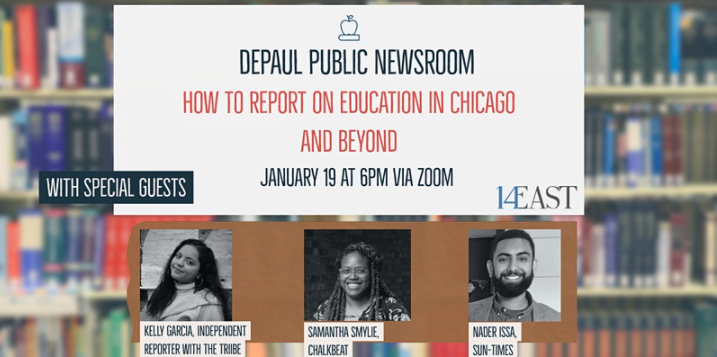On Tuesday 14 East held our first public newsroom of 2021 on how to report on education in Chicago and beyond. We had a lineup of experienced panelists, including Nader Issa of the Chicago Sun-Times, Sammie Smylie of nonprofit education newsroom ChalkBeat, and independent reporter and DePaul alumna Kelly Garcia, who reports with The TRiiBE and other Chicago publications.
While the three share the same overarching beat — education — they all have their own specializations and knowledge which they were kind enough to share with us.
Here are five things that we took away from our time with three of Chicago’s best education reporters.
While the COVID-19 pandemic has taken a great toll on Chicago communities, it has also made some things more accessible
If you learned about Local School Councils (LSCs) for the first time this year, it’s most likely thanks to Kelly Garcia. In Chicago, where the school board is appointed, LSCs, which are elected, are key players in local school democracy.
The summer of 2020 saw an uptick in LSC participation and awareness due greatly to the fact that LSC meetings were online. While the technology gap remains large within the Chicago Public Schools district, meetings that were once closed, are now open and accessible because they are online.
Activism comes in many forms and how you report on it matters
While the Chicago Teachers Union may be one of the most popular examples of activism in education, activism goes beyond union members.
“To live is activism,” said Nader Issa when discussing the constant advocacy of parents for their children. Activism goes beyond CTU members marching in the snow for better working conditions. When you are part of a system that is meant to serve, but doesn’t do so, activism in the form of advocacy is necessary.
As journalists, we act as translators to the public
Education legislation can get technical and it’s the role of the reporter to translate the legal and technical jargon into information that is digestible for those who need it most. Chicago Public Schools do not have a history of transparency, according to Issa, Smylie and Garcia.
With any institution that lacks transparency with the public, it is our job to act as translators and communicators.
Building long-lasting relationships with our sources is necessary
Building relationships with sources is an important part of journalists but ensuring that they are long-lasting is another important task. In education reporting, this is especially true. Issa, Smylie and Garcia work to maintain strong, long-lasting relationships with their sources. They check in with them often and will even go as far as send them a text on the first day of school to wish them good luck.
From teachers to parents and bus drivers and janitors, maintaining relationships with sources is an essential part of reporting.
Learn how to say no: mental health is key
In 2021, learn how to say NO when you have too much on your plate and are feeling overwhelmed. It’s common for journalists to feel like we have to say yes to every opportunity that comes our way, but it’s okay to say no sometimes, especially in order to prioritize our rest and our health.
Go to therapy if you can, talk to friends, get your ass off Twitter and set aside time for yourself away from work. Go to sleep at a reasonable hour (NOT 4 a.m. — yes, we’re looking at you, journos). Chicago is depending on you –– take care of yourself.
Header image by Hannah Coyle




NO COMMENT